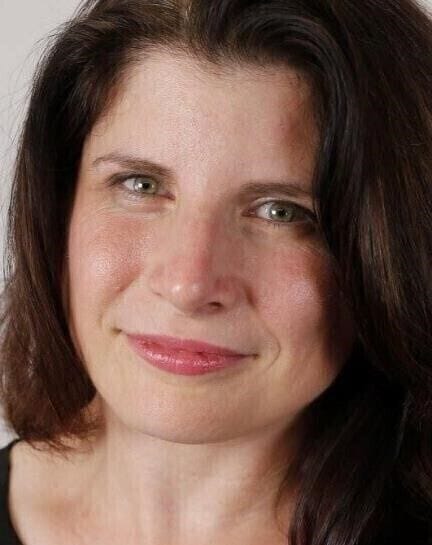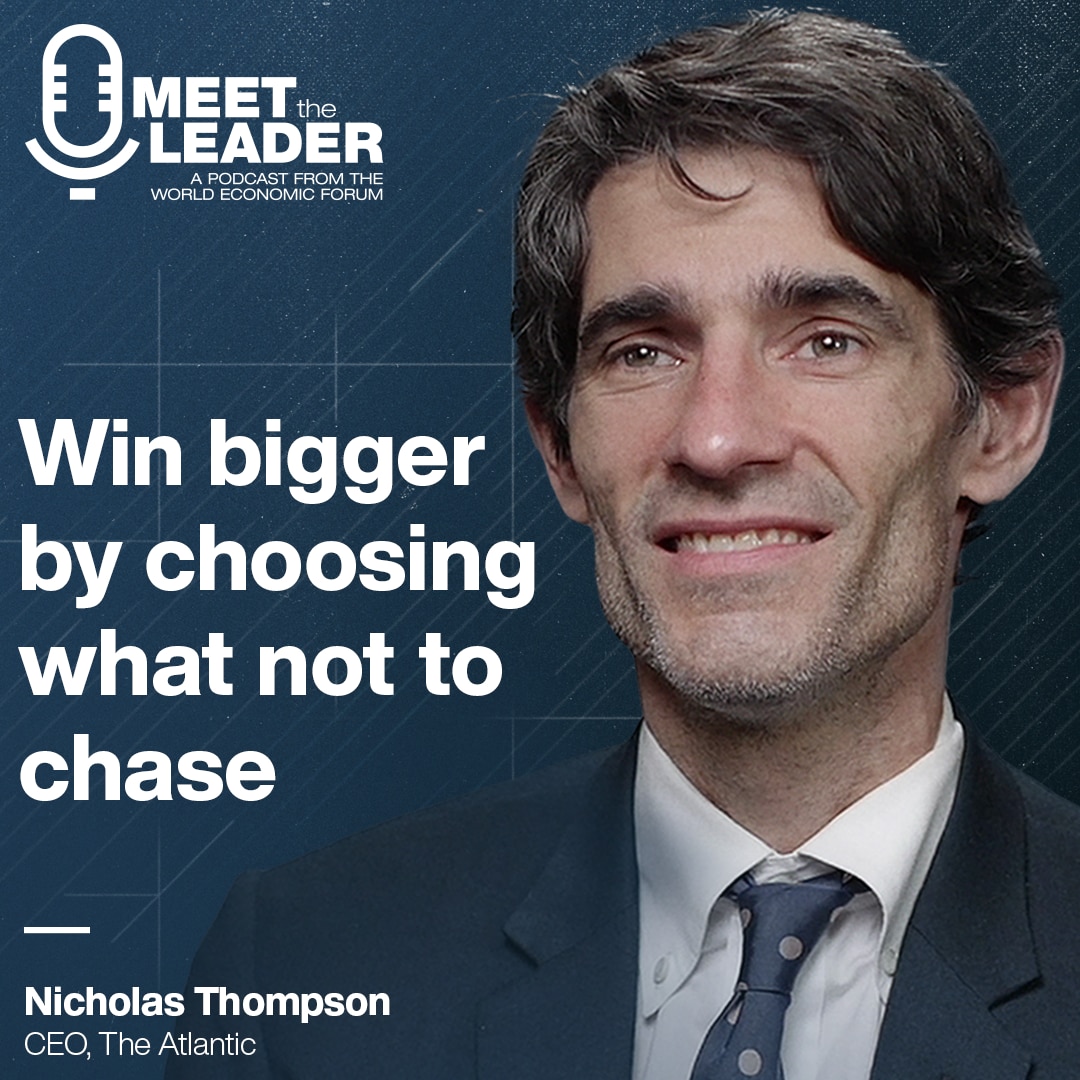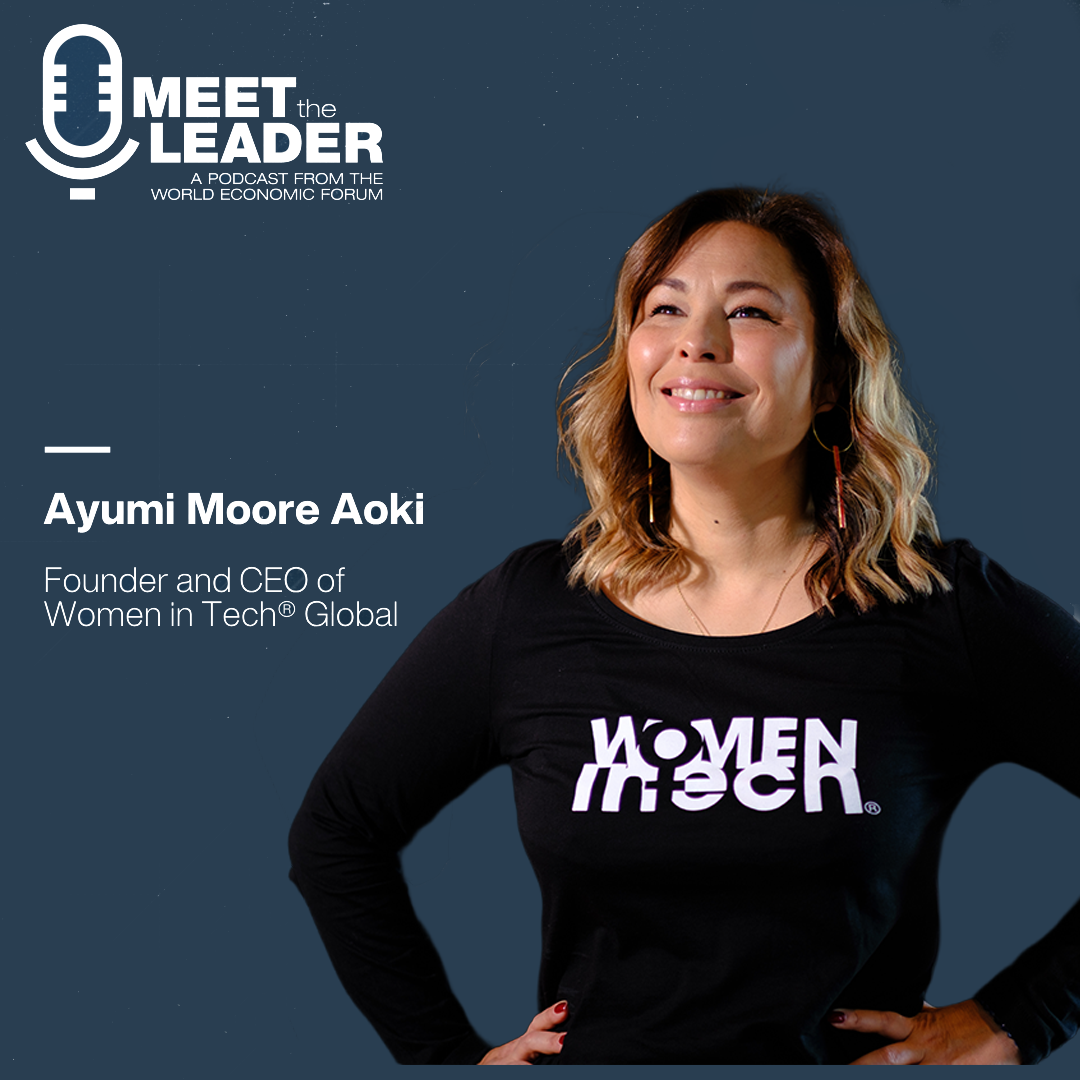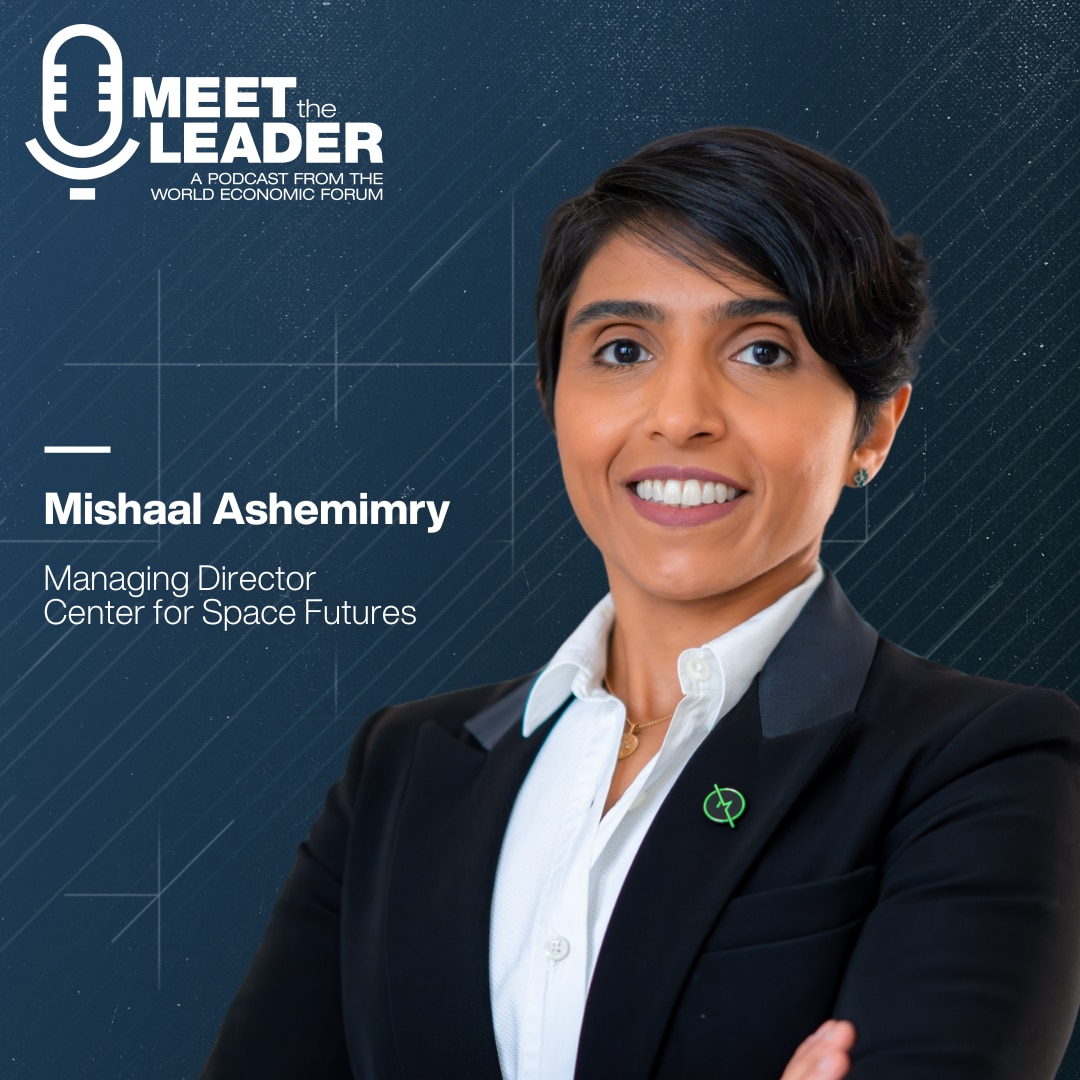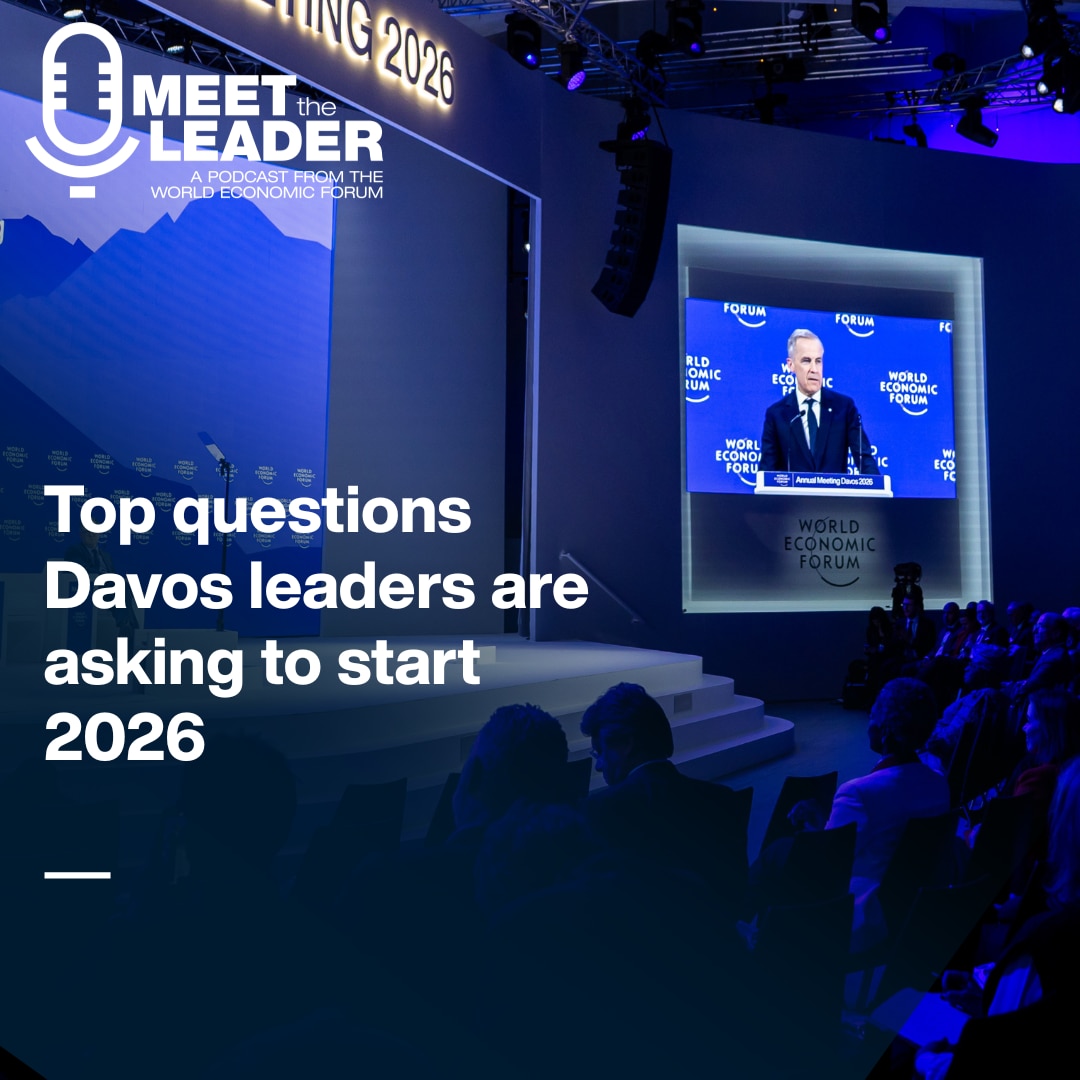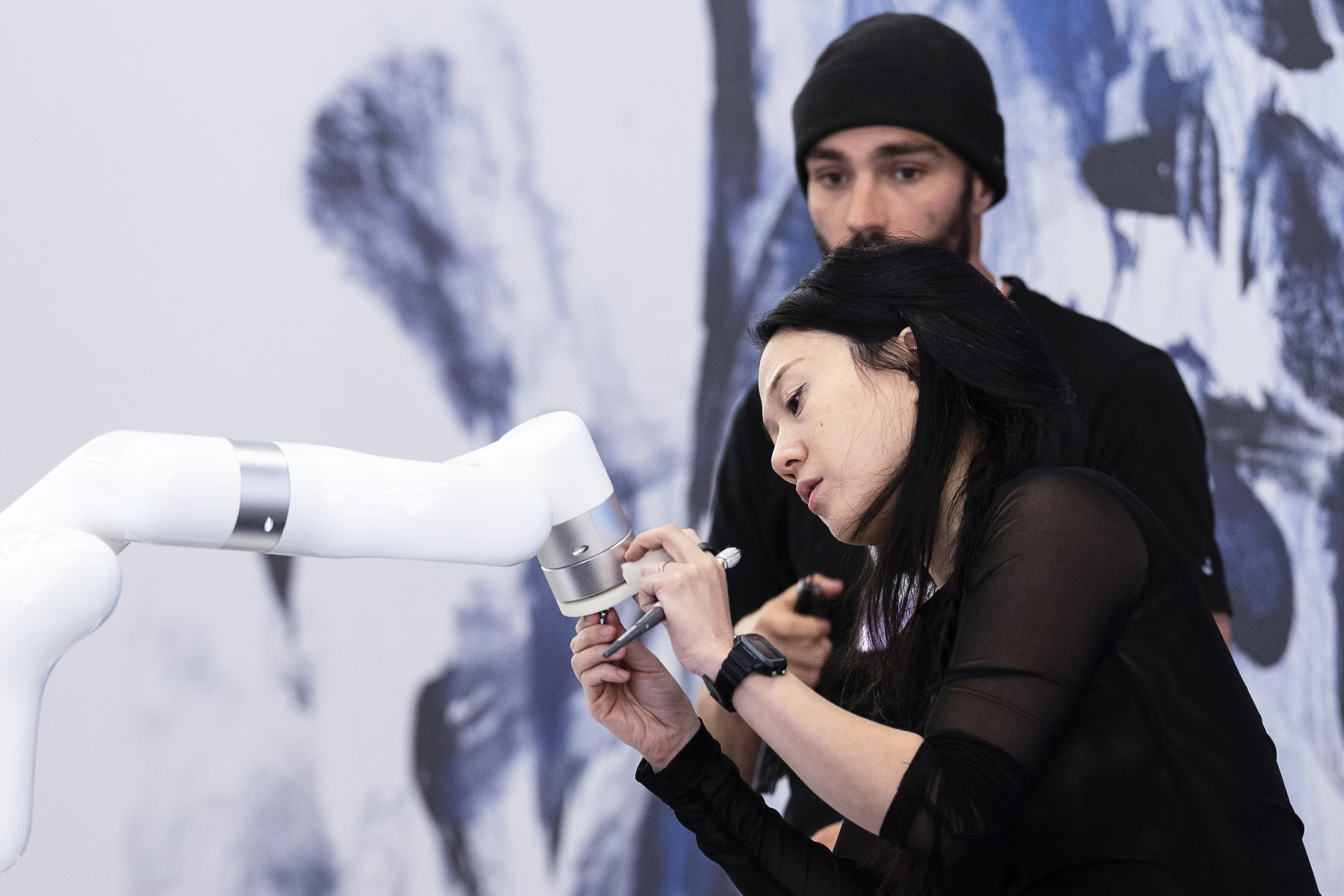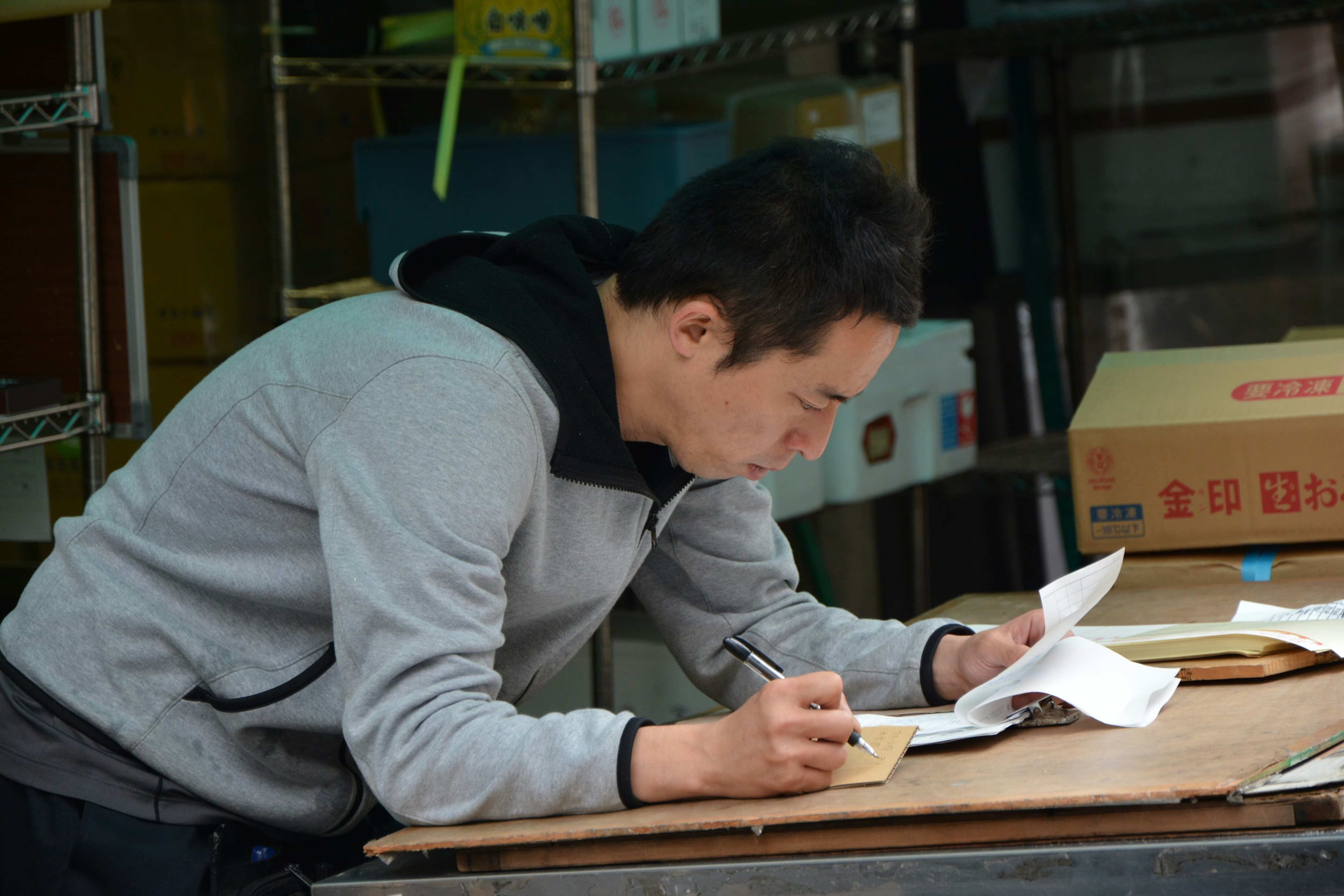9 leaders from Microsoft, IKEA and more share advice for new grads
Transcripción del podcast
Annette Mosman, APG If I would have known that a lot earlier. I think I would have made much more fun in my career and in the work. Much more impact.
Linda Lacina, Meet The Leader Welcome to Meet the Leader, the podcast where top leaders share how they are tackling the world's toughest challenges.
In today's special compilation episode, CEOs, HR leaders and more share advice for new grads that can help anyone at any stage of their career.
Subscribe to Meet the Leader on Apple, Spotify, and wherever you get your favorite podcasts. And don't forget to rate and review us. I'm Linda Lacina from the World Economic Forum and this is Meet the Leader.
Ulrike Biesèrt, INGKA Group Lead yourself. But you can't lead yourself, in my experience, if you don't know yourself.
Brad Smith, Microsoft Watch what works. Watch what doesn't work.
Rishi Khosla, OakNorth Be in a place which actually does have a growth mindset.
Olajumoke Adekeye, Young Business Agency Be strategic about what they are communicating and up front.
Linda Lacina, Meet The Leader Today's grads will build careers that don't look like any that came before them. That is not hyperbole.
Tech cycles are moving faster than ever. Lives are lasting longer than ever. The teams that they join will be some of the most multigenerational in history, changing how they work with others and even how they lead. And they will help to pioneer new career phases and stages and ways of working that we can't make room for right now.
So how can we help these grads make the most of this first phase? That is the question that I asked some of the leaders that I have spoken to in recent months both at Davos and other events. And I talked to CEOs of recruiting firms, HR leaders at Intel and Ikea and other leaders who are driving and shaping the next generation of workers.
These folks came through with their best tips for new grads on everything and how to better work with teams, how to find a mentor, and even how to find yourself. These tips are things that don't just help new grads. I think they can help all of us, no matter how long we've been in the workforce.
We will get started with Sander van't Noordende. He is the CEO of Randstad -- that is a leading global recruiting firm based in the Netherlands. And he shared with me the insights of their latest Workmonitor report. Data shows that workforces are changing, that workers are more than ever driven by purpose, and in some cases are even less interested in things like advancement over things like flexibility and balance.
If you're interested in that episode, that's number 124. And before you hop to that, I will share with you a highlight from our conversation and approach to work that he has espoused for decades. Advice that's classic for any generation.
Exceed expectations
Sander van't Noordende, Randstad Yeah, I always say, and I've been saying it actually for for 30 years. I know that dates me. Of course. I think there are three very important characteristics. I would say one is -- I call initiative, you know, don't wait for someone to ask you to do something, but, you know, just do it. Get the work done, whatever, whatever it is. I think that's really, really important.
Then in terms of what you do and how to do it, you know, just do a tad more or a tad better than the expectation is because you know you will enjoy it better. You will have a happy client or a happy manager or think that's really, really important.
And then last but not least, I would say personal connections. Despite all the technology there is out there, ultimately people make the world go round and it's about the connection that you have with your customer, that you have with your colleague, that you have with your manager. I think personal connections and your network are ultimately a very important differentiator in the successful career.
Browse more - and have fun
Linda Lacina, Meet The Leader Annette Mossman is the CEO of APG. It's one of the world's largest pension investors. She's been active in the forum's work on longevity, including our recent Longevity Economy Principles report, exploring how our finances and planning are going to need to change as we live longer than ever. I asked her what advice she would give to an 18-year-old version of herself. She said she'd remind that girl to browse more.
Annette Mosman, APG And I think I would say to the the little me, don't hesitate. When you fall, you always will get up. And, I think that feeling, you give to the little me -- and maybe youngsters are different at this period that much more a senior and secure and learn learn to love much, are more open to what's happening in the world -- And I think this little voice which you have on your shoulder, who says somebody will find out that you don't know it. Somebody will find that you're on the wrong place -- Skip it.
I think if I would have known that a lot earlier, I think I would have, made much more fun in my career and in the work and much more energy and much more impact.
I think this little voice which you have on your shoulder, who says somebody will find that you're on the wrong place -- Skip it.
”Linda Lacina, Meet The Leader She also stresses the importance of discovery and exploring. Here's some of the questions you can ask yourself in that process.
Annette Mosman, APG I think always try to envision how you like to live your life, and that's a nice discussion. Are you thinking about kids and what does that mean? And also about what is your dream? So does it mean we have to both work or do we choose other combination? This for me is very important to have the dialogue. So don't do Excel sheets, but have the dialog with yourself, with your friends and think about it. I think that's the most important thing.
Build Your Personal Board of Directors
Linda Lacina, Meet The Leader Finding the right advisors can be critical, especially at the start of your career. Rishi Khosla knows this well. He is the founder of OakNorth, that is a digital commercial bank that helps companies scale, but it also has created a special mentor partnership program with the London School of Economics, building socially conscious businesses all through mentoring. I asked him what makes a good mentor?
Rishi Khosla, OakNorth It's really someone who provides an opinion but doesn't impose their the their perspective. Right? So helps help someone think through -- decompose almost -- the thought, the question, the dynamic. And through that actually just helping work the thought process with the mentee.
If a mentor is strong with their own views -- I think it's advice. In our view, it's sort of what makes a good board member. Right? You want diversity in opinion. You don't want to board with a single voice. In the same way, you don't want a mentor to have to have a strong single voice. Helping run the thought process is, is really important.
It's really understanding that if you're open to being mentored, if you're open to -- in a way -- listening, then you can get mentored from all different angles and from many different people, not necessarily someone who's like an icon within your world.
If you're open to being mentored, if you're open to listening, then you can get mentored from all different angles and from many different people.
”That's also been a clear realization, right? In terms of actually a mentor doesn't have to be someone -- it has to be someone who has high believability in the area that you're interested in, but that maybe not necessarily, for example, if you're building a business in your specific industry.
Make Time for Face Time
Linda Lacina, Meet The Leader I also asked him what all new grads should do to succeed in their first job. Here's what he had to say.
Rishi Khosla, OakNorth So, this may be unpopular. The first thing I'd say is go into an office if you have an office to go into. Because the amount you learn passively of just being around in an environment. Again -- Davos why isn't Davos online right? like everyone travels in whatever minus ten centigrade temperatures to be in proximity with each other right. That serendipity which exists, that human interaction, is just so, so critical to learn.
This may be unpopular. Go into an office if you have an office to go into.
”Outside of that, the learning cycles, the iterations, the developments are just speeding up. Again, going back to Gen AI, it's going to touch so many areas of what a company does. And frankly, if companies don't embrace and don't evolve, not over a 1- or 2-year period, but over five-, ten-, 15-, 20-year period, those organizations are going to find it very hard, right? So, so being in a being in a place which actually does have a growth mindset and, and continually learning through that -- Absolutely critical.
Tap Into Your Self-starter Mindset
Linda Lacina, Meet The Leader Christy Pambianchi is the chief people officer at Intel. That is a technology company that is one of the world's largest chip makers. She talked to me about the way that Intel helps to integrate these new grads into the company and into their first jobs. But she also shares how this new crop of graduates have a special advantage. Thanks to YouTube and TikTok, they are used to teaching themselves any new skill that they want to learn. She reminds us that these new grads are natural tinkerers, and that's a talent that workers and bosses can make the most of.
Christy Pambianchi, Intel For young people joining the workforce. One of the things I think we have put a more attention back on is just actually sharing and helping educate, you know, new entrants coming right out of school and just social practices in the workplace. You know, we can't presume that they have that from before. It's very, very basic. But we find that that's really, really helpful for our college hires are new entrants to the workplace.
And then in addition, really kind of quickly helping them understand what are all the resources available to them. What's really great about the new generation is they've grown up digital first, and they're a generation of what I call tinkerers. You know, they've grown up just looking for how to do things online, self helping themselves. And so that's really, really exciting. And so I try to figure out how can we channel that inside the workplace.
And instead of telling them everything of how to do everything, kind of pointing them toward what are the resources inside the company where you can, whether it's web resources, digital resources, knowledge workers that can help them, how can you -- where are those places to point your inquisition to, you know, keep your curiosity spurred and then find resources to help you on the job?
And I think that's a really important distinction for this generation of workers coming in. They are self-taught. They like to understand, they like to create. They've been brought up to be makers, curious, innovators. And so I think we have to think about how do we create that in the workplace.
That's a really important distinction for this generation of workers coming in. They are self-taught. They've been brought up to be makers, curious, innovators. And so I think we have to think about how do we create that in the workplace.
”
And I would say 10 -20 years ago, a lot of the thinking was how can I accelerate time to competence? How can I tell everybody exactly how to do their job? In a sense that removes creativity because it's saying, "do these ten things and don't do anything other than these ten things in this particular job." So now we want to be able to educate people on here's the core of a role, but here's all the places you can go to get resources and help self-help and drive innovation in that.
Build Relationships By Building Trust
Linda Lacina, Meet The Leader Madison O'Brien is a community engagement lead with Teamgage. That is a special digital platform that helps build strong company cultures and engagement.
She is one of our Global Shapers as well. That is a special community of young people all around the world who help drive change in their communities. She stresses the importance of building trust with a team. Here's why that's important and how to do it.
Madison O'Brien, Teamgage In the first stages, that's really focusing on doing what you say that you're going to do. Focusing really hard on making things work. Asking a lot of questions along the way and keeping those curiosities open.
I think as well, for young people, it's really important to know that it can be really daunting to enter the workforce and to perhaps feel like, sometimes you may not have that opportunity to speak up. So, I think it's finding your allies in the workforce, finding really great mentors that you can confide in and talk with. But also not being afraid to speak up where you see things that perhaps aren't working so well.
So keep contributing to the conversations, keep sharing your ideas because they do matter. And we do need to see more of them from young people in our workforces.
Linda Lacina, Meet The Leader Ulrika Biesèrt is the CHRO, the chief human resource officer, of IKEA. She also stressed that today's grads should spend these early days getting to know themselves. Here's how to get comfortable learning and unlearning.
Learn, unlearn, learn
Ulrika Biesèrt, INGKA Group The first that comes to my mind, but I think, is to think it's to have curiosity. Open mindset. Be prepared to learn. And I think that will be the biggest change with this generation is that they will be constantly unlearning, will be learning, upskilling. And so you need that curiosity and a learning mindset.
The biggest change with this generation is that they be constantly unlearning, learning, upskilling. And so you need that curiosity and a learning mindset.
”But for me that might be a little bit too technical because I'm looking at, you know, and if I'm paranoid as to what is happening in the world and work and see things as mental health, we see that is really decreasing and rewire in a negative way. I think most important (for not only young people, but the question was young people) is to get to know yourself.
Who are you for real, in trying to be yourself at the greatest extent? Because directly, when you start to play a role, your energy's leaking.
So that is one piece of advice: be if you can, be very intentional, what company you choose to work for.
And in that it becomes lead yourself. But you can't lead yourself in my experience if you don't know yourself. So I would say specifically, because we talk so much about resilience now, so much about agility, so much on constant changes you can take in the broader perspective. Also with social media with pressure to always have something to compare to. I think the pressure -- you have the climate and I can continue. It's quite a lot of pressure on young people today also about the future and how the future will look like. I think to build up yourself, to feel good about yourself, to build strengths within yourself, to find your values and how you can navigate yourself is the biggest gift you can give yourself. And then you will also take, I believe, better decisions because you will take decisions based on what you are, what you need, not what others want from you.
Take your space
I'm always talking about my mother. Unfortunately she is not with anymore, but she was a very strong woman and very vocal. And she said to her all her four children that you need to be financially independent. And my advice to you is that you educate yourself. You never know what is happening in life, that knowledge people can't take away from you. And education will most likely help you to have a job. So that was one.
Take the space. If you don't take the space, someone else will take it and don't allow that.
”And the other one where I think she was probably ahead in her time, specifically to her three daughters. she said, take the space. If you don't take the space, someone else will take it and don't allow that. And it actually helped me, to be honest, in, you know, in management meetings, in beginning of my career, I always been the only female, and I've always had that in my head, like, take your space and don't excuse yourself for taking space. And I think that is a very good advice for young people.
Sell your skills
Linda Lacina, Meet The Leader Olajumoke Adekeye is the founder of the Young Business Agency. Now that's an employment accelerator in Nigeria that has helped thousands of young people better position themselves for future jobs and careers. She sees her share of resumes, and she shared with me a simple way that new job hunters can better sell their skills to employers. Here's what she'd like to see.

Olajumoke Adekeye, Young Business Agency They need to be strategic about what they are communicating and up front sometimes. You've often seen that the first half of the first page of a CV would be the job seekers' demographic or, biographical information, which doesn't demonstrate to the hiring manager that they have the experience, the skill that they require to actually deliver on the job. And so one of the first things we advise jobseekers to do is to actually first just ensure that the first half of the recipe or the CV demonstrates to a hiring manager that has just 10 seconds that they are the people. There are many ways, many formats in which to do that. But we often recommend that they pay attention to who the audience is, the documents that they're putting together, so that they can actually, have a chance at being considered for a job.
Strengthen your understanding of tech's changes across key sectors
Linda Lacina, Meet The Leader She also drove home the need to continuously learn to keep pace with new technologies.
Olajumoke Adekeye, Young Business Agency I think one thing that's going to be very important is continuous learning, lifelong learning. There are courses, free courses that are available, about on AI, online. I think that young people anywhere who have access to the internet can take advantage of that, and grow and learn, about, artificial intelligence. There are tech hubs, accelerators, incubators across, the sub-Saharan African continent, for instance, where I'm from, that are beginning to have a focus on this. I think the opportunities for young people to connect with individuals, experts, startups, organizations that are working with AI, are looking to leverage on AI, and ensuring that they are within those circles, that they have access, that they take advantage, actually, of these communities, these opportunities, to read and grow and learn about it.
I think also, importantly, whatever sector young people may find themselves in or may find that they might be interested in, it's to understand how AI may affect your sector and ensure that with the power of social media, they're able to follow the key experts and continuously grow and learn. I think, we're seeing that it's going to be incredibly important to be knowledgeable, but also to reflect each one's abilities, propensities and interest. And my advice is not for young people to, for everyone to, take on AI as their, primary work or subject of interest. But it's going to be very important to have a breadth of understanding, across different sectors. And it's going to start by doing the basics.
Make Time for Mastery
Linda Lacina, Meet The Leader Brad Smith is the president of Microsoft and a 30-year veteran there. He shared with me the advice he gives all new employees: to use the first days of their career for mastery. It's a reminder for all of us on the importance of honing our craft.
Brad Smith, Microsoft I've always believed in, you know, I'm maybe I should change, but I still believe that your first job, more than anything, is an opportunity to learn. Learn from everything and everyone around you. Spend time with other people. Watch them. Watch how they interact with each other, Watch what works. Watch what doesn't work. Hone your professional skills. It is a time, frankly, to work hard and try to be a perfectionist. Do the extra draft of whatever it is you're writing to get it right. It's a time to invest, frankly, great pride in your work.
Spend time with other people. Watch what works. Watch what doesn't work. Hone your professional skills.
”
If you get those habits mastered early in your career, they will serve you so well for the rest of your life. And then if you happen to have jobs where you then manage and lead a team or an organization, then you have to learn to let go, a little bit and trust others. But you have to always be the one to set the standard for the quality bar. Great organizations always consist of great people who work together and believe in a common mission and are committed to quality. And that is really a professional quality for whatever the profession happens to be.
Remember: Hope is the engine of change
Linda Lacina, Meet The Leader And last but not least, we come to Catalina Cock Duque. She is the founder of Fundacion mi Sangre, that is an organization in Colombia dedicated to shaping the next generation of leaders, all through trainings on skills that can often be overlooked -- things like empathy, conflict resolution, and tolerance. Here is the advice that she thinks all new grads can remember.
Catalina Cock Duque, Fundacion mi Sangre First of all, that in times of crisis, hope is a must. And it's the energy and the engine of change.
And second, I would say that they should open many paths, many possibilities. I know when we're young, sometimes we're very driven and have a clear goal and clear ambitions. But if you're open to more possibilities, many, many opportunities can come.
In times of crisis, hope is a must. And it's the energy and the engine of change.
”I think you can train your brain to become optimistic. Practicing gratitude, for example, connecting to leaders and initiatives that are creating change. I think sometimes we are overwhelmed by the size of the challenges that we're facing, so we feel we could never change the world. But we can change small worlds. We can do a small part.
So go and connect in your communities and your surroundings with people who are leading the change and make sure you -- hope is contagious. So make sure you get in contact with them.
Linda Lacina, Meet The Leader Thanks so much to all of the leaders who talked to me for this episode, and thanks so much to you for listening.
Find a transcript of this episode, as well as transcripts from my colleague's podcast Radio Davos at wef.ch/podcasts.
This episode of Meet the Leader was presented and produced by me, with Taz Kelleher as editor, Juan Toran as a studio engineer in Davos and Gareth Nolan driving studio production.
That's it for now. I'm Linda Lacina. From the World Economic Forum. Have a great day.
Today's grads will live longer, face faster cycles of technological change and drive careers like we've never seen. This special compilation episode taps top leaders from companies like Intel, Microsoft, Ingka Group and more on the unique ways they can make the most of the first days of their careers. From remembering to "take your space" to finding time to "browse", they share the advice that has shaped them, tips they wish they knew sooner, and advice that can help anyone at any stage of their careers.
In this episode: Olajumoke Adekeye, Founder, Young Business Agency; Ulrika Biesèrt, CHRO, Ingka Group; Sander van't Noordende, CEO, Randstad; Rishi Khosla, Co-founder and CEO of OakNorth; Annette Mosman, APG; Madison O'Brien, Teamgage; Christy Pambianchi, Chief People Officer, Intel; Brad Smith, President, Microsoft.
Alojado por:
Más episodios:
La Agenda Semanal
Una actualización semanal de los temas más importantes de la agenda global
Más sobre Empleos y el Futuro del TrabajoVer todo
Ravin Jesuthasan and Ana Kreacic
11 de febrero de 2026
